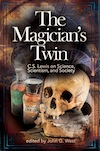 Culture & Ethics
Culture & Ethics
 Evolution
Evolution
 Faith & Science
Faith & Science
C.S. Lewis Was “Prophetic” on Science, Scientism
 Reporter Jeff Schapiro has grasped the importance of the new book from Discovery Institute Press, The Magician’s Twin: C.S. Lewis on Science, Scientism and Society, edited by John West. It’s positively uncanny the way Lewis anticipated many of the causes for concern about the rule of Big Science that we deal with every day here at ENV, whether it’s the slavish adherence to orthodox Darwinian theory so common in the intellectual and even in the religious worlds, or the increasingly disturbing ethical offshoots of the materialism that Darwin represented.
Reporter Jeff Schapiro has grasped the importance of the new book from Discovery Institute Press, The Magician’s Twin: C.S. Lewis on Science, Scientism and Society, edited by John West. It’s positively uncanny the way Lewis anticipated many of the causes for concern about the rule of Big Science that we deal with every day here at ENV, whether it’s the slavish adherence to orthodox Darwinian theory so common in the intellectual and even in the religious worlds, or the increasingly disturbing ethical offshoots of the materialism that Darwin represented.
Meanwhile, with shocking frequency, Lewis has been promoted as a mascot for theistic evolution. Readers of The Magician’s Twin will find that the truth is much more complicated — and more interesting — than that. Writing in the Christian Post, Schapiro summarizes:
There were some principles of the evolutionary theory that Lewis rejected altogether — such as the idea that evolution occurs through undirected natural selection — though others he accepted. Although Lewis believed in a literal Adam and Eve and mankind’s fall from grace as told in the Old Testament book of Genesis, for example, he also believed the theory that says all living creatures have a common ancestor, though he became more skeptical of that theory later in his life, says [CSC associate director Dr. John] West.
The title of the book comes from Lewis’ The Abolition of Man, in which he calls modern science and magic “twins.” West says Lewis was concerned that some would use modern science in the same way they tried to use magic in medieval times, to control nature.
“The downside is if you want to control the world then you may get delusions of grandeur, or you may try to play God … The deification of science, the application of science to morality, the use of science for things like eugenics and breeding a better human race are things that really concerned him,” said West.
Lewis was concerned that the power of science would be abused, so what would he think of the use of science in the world today? West says Lewis was “prophetic” when it came to his concerns about science.
“I think he would have been aghast at how correct he was … and in some sense things are coming to the point that he predicted,” said West.
Even as a young man, Lewis already grasped that “the ideas of Charles Darwin and Herbert Spencer were built ‘on a foundation of sand.'” Of course, that sand has blown into the wind considerably since Lewis’s day.
